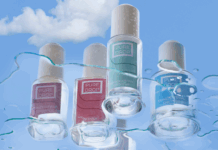German company Evonik has developed a new skin microbiome model. According to the company, this model enables scientifically-supported evaluation of the influence of cosmetic ingredients and products on the skin microbiota in laboratory tests.
Evonik is currently testing cosmetic ingredients from its own product range to obtain factual information on their compatibility with the microbiome. This meets the expectations of cosmetics manufacturers and consumers who are increasingly interested in scientific evidence of the efficacy of cosmetic products. In addition, this data will provide Evonik with a basis for developing cosmetic ingredients that take this information into account.
Evonik points out that the skin microbiome - which includes the bacteria, fungi and viruses present in the skin - varies from person to person. It is exposed to many internal and external influences, from diet to sunlight. The presence of specific bacterial strains is characteristic of certain areas of the skin, which can be described as sebaceous, moist or dry.
"Many modern cosmetics claim to be microbiome-friendly, explains Stefan Pelzer, head of microbiome research at Evonik. However, the tests currently used do not fully reproduce the complexity of the skin microbiome."
Evonik's new skin microbiome model precisely studies the interactions and mutual interdependencies between microorganisms in the laboratory. To do this, between eight and ten typical skin microbes are grown together. The conditions are chosen so that all strains of bacteria can proliferate and interact. This is a particular strength of this new approach.
Parameters are increases or decreases in biomass and changes in crop diversity for a test substance compared to a control. They are then entered into an evaluation matrix as "microbiome stimulating", "microbiome favorable", "microbiome modulating" or "microbiome detrimental". Any significant change in bacterial diversity is considered detrimental, as the protective function of the skin microbiome depends on the natural balance of microorganisms.
Standardized plates enable 48 individual samples to be studied simultaneously. "Our new model bridges the gap between conventional in vitro tests, which are simple but less meaningful, and in vivo studies on test persons, which take longer."says Stefan Pelzer.
In addition to the coculture model for balanced skin, Stefan Pelzer's team has already developed a model for acne-sensitive skin. Further models will be developed in collaboration with customers from the cosmetics industry. In addition, work to improve complexity has already begun. One possibility would be to combine bacterial cocultures with tissue and cell culture models. Indeed, as Pelzer explains, micro-organisms interact not only with each other, but also with skin cells.
Scientifically-based efficacy claims will be the key to growth in the cosmetics industry. According to a recent study, one in two young consumers gathers detailed information on product benefits and ingredients before buying.
Evonik's expertise lies in its Biotech Hub and Skin Institute. The Biotech Hub brings together the company's biotechnology expertise. The role of the Skin Institute, created in 2023, is to provide proof of dermocosmetic claims for Evonik's current and future portfolio of cosmetic ingredients.
Photo : © Evonik Industries AG








